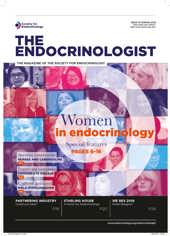My scientific career began in 2007 at The Barts Cancer Institute, London, when I started my PhD. I was in the Department of Molecular Oncology, and was studying mechanisms of development of pancreatic cancer. Our group leader was a female clinician, my day-to-day supervisor was a female postdoc and the other PhD student in the lab also a woman. We had one male team member, a research technician.
After my PhD, I moved to the Oxford Centre for Diabetes, Endocrinology and Metabolism (OCDEM) at the University of Oxford, as a postdoctoral scientist for Raj Thakker. This was where I joined the endocrinology family. I now research mechanisms and treatments for pancreatic neuroendocrine tumours, and have been doing so for 7 years. Our team currently consists of 12 people, 9 of whom are women.
Therefore, despite working in slightly different disciplines, from early in my career I have been part of predominantly female research groups. Maybe because of the number of women I have worked with, until now gender has never really been an issue. I’ve never felt I’ve been treated differently from any of my colleagues (male or female) either at work, or at meetings and conferences. Maybe I’ve been lucky, as I do have friends from my PhD days who’ve had different experiences.
ENCOUNTERS OUTSIDE SCIENCE
Interestingly, the people who have made comments about what I do are non-scientists/non-clinicians. I always love the reaction when I meet someone for the first time and they ask what I do for a living. When I say I’m a scientist at the University of Oxford, the usual reaction is a look of surprise, generally followed by ‘I never would’ve guessed that!’ or ‘Oh, so you’re a science teacher, what age children do you teach?’ The other classic exchange is ‘Is it Miss or Mrs?’, and when I say ‘It’s Dr.’ I get the response ‘Oh!’
ACHIEVING RESEARCH INDEPENDENCE
I’m now reaching an interesting stage of my career, the point of trying to achieve research independence. I’m sure this is a daunting prospect for all researchers, and it isn’t any different for me. This is when I must take ‘a leap’ to try and get funding for my own research and, more challengingly, for my salary.
To date, I’ve managed to get a few research grants for consumables, but have always been employed, so haven’t had to worry about getting money to pay my salary too. Luckily I have a contract for at least another 2 years as a postdoc, so I have a bit of time to come up with a plan.
Like most people, I’m considering two options: one is trying to get a lectureship position and the second is applying for a fellowship. Unfortunately, both are very competitive, with success rates for fellowships particularly poor. Of course, the more difficult route is the one I’d prefer. If I start applying soon, hopefully I will have something in place for when my contract ends. At least, this is what everyone seems to be advising me to do.
VALUABLE SUPPORT
Actually, I’ve discovered that a lot of researchers are very helpful and more than willing to chat and give advice. This has definitely helped me to weigh up my options and to try and decide which would be the best for me. As much as it is terrifying, it is also an exciting part of my career. If successful I will be able to run my own group, doing my own research, which is what I’ve always wanted to do.
Based on my experience so far, I’m not expecting my gender to affect the process. It is easy to see, however, that the number of female researchers seems to decline as you go up the academic pay scale. There are definitely more male professors than female ones in the institutes I have visited.
I’m sure there are many reasons for this trend. I like to think that this situation is now changing, especially given that there are now so many inspirational female scientists as role models and mentors. All being well, I’m hoping I can become one too in the future.
Kate Lines, Postdoctoral Research Scientist, OCDEM, University of Oxford






